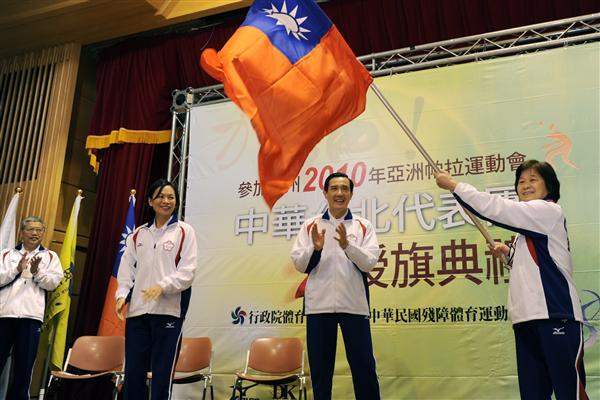News & activities
 News releases
News releases
President Ma Ying-jeou attended a ceremony on the afternoon of December 7 at the Sports Affairs Council in which the nation's flag was presented to the ROC contingent that will participate in the Guangzhou 2010 Asian Para Games. The president stressed that the government is improving the environment for and treatment of handicapped athletes and encouraged team members to do their best in winning distinction for the nation and creating a better life for themselves.
President Ma remarked that the Asian Para Games, originally known as the Far East and South Pacific Games for the Disabled (FESPIC Games), is the largest and most competitive athletic event for disabled athletes in Asia, and this marks the first time that the city hosting the Asian Games is following up with the Asian Para Games. The event not only provides an opportunity for disabled athletes to exhibit their abilities, but also helps to promote people-to-people diplomacy.
The president stated that the ROC began participating in the FESPIC Games in 1994 and put in outstanding performances the four times it took part. The ROC team won 18 gold medals, 29 silvers, and 22 bronzes at the 9th FESPIC Games in Kuala Lumpur in 2006, and was widely praised for its excellence in the competition. The ROC's team to the Asian Para Games in Guangzhou includes 77 athletes who will take part in 12 events. The president expressed his hopes that they will perform to the best of their potential.
President Ma stated that he has always placed importance on athletic activities for the disabled, and as Taipei City mayor often invited disabled persons to participate in all types of activities. He also arranged on occasion to provide cash rewards to disabled athletes matching those of regular athletes who win medals in competition, and hopes to gradually increase the cash awards in the future. The Sports Affairs Council, he remarked, has relaxed rules on the issuance of cash prizes for winners at the Asian Para Games. Team members originally qualified for awards only if competitions had at least five athletes from five countries. Now, however, competitors will receive awards if they place in the top three (except if they place third in a competition with only three competitors). The awards for gold, silver, and bronze medal winners are NT$380,000, NT$230,000, and NT$150,000, by which the government intends to demonstrate the importance that it places on disabled athletes.
President Ma stressed that athletics are important in fostering a culture of sports and are about more than just the pursuit of winning medals or award money. He pointed to research by Harvard University Department of Psychiatry professor Dr. John J. Ratey that shows that athletics can stimulate the brain, increase intelligence, and foster emotional stability. Consequently, the people of Taiwan need to embrace the idea that "physical strength translates into national strength," and therefore cultivate a habit of exercise. Sports are important in creating a well-rounded person, he said. Lastly, the president again urged the athletes to do their best in winning distinction for the nation and creating a better life for themselves.



